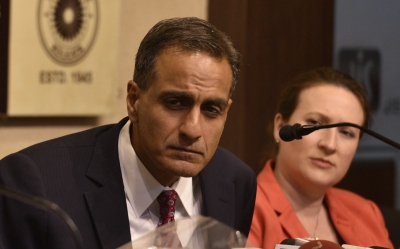America
US Deputy Secretary of State Richard Verma Praises 'Unimaginable' Progress in Bilateral Ties with India

Washington, DC, September 17:
The advancement in connections was "unimaginable" a few decades ago, according to Richard Verma, former American Ambassador to India and current US Deputy Secretary of State for Management and Resources, who praised bilateral collaboration with India.
Verma praised the development, referencing a speech by Prime Minister Narendra Modi, who said that the two countries have moved past their historical reluctance.
Verma stated, "I will say this is exactly the right time to assess where we are in the US-India relationship" while speaking at an event called 'The United States & India: Milestones Reached and the Pathway Ahead' at the Hudson Institute in the US on Monday (local time). A quarter of a century of advancement is upon us. Developments that were unthinkable even a generation ago. We failed to work together for much too long in our recent past. The geopolitics of the Cold War split us. The years between the mid-60s and the late 90s were virtually a generation of lost progress. However, we have finally triumphed over those historical hesitances, as Prime Minister Modi has astutely noted.
Changes in policy in both India and the United States have been the driving forces behind the improvement of ties between the two countries, according to Verma, who has experience as both an ambassador and a former US ambassador to India.
Policy shifts in both capitals were the impetus for the development. Energy, security, and trade were critical areas that required innovative thinking and strong leadership to accomplish. The post-WWII order was threatened collectively, which led to our new alignment and rekindled collaboration, Verma added.
"But at the core, it was the hard work of millions of people in our two countries who pulled us closer together by travelling, studying, researching, developing joint products, and taking the risk to immigrate and start over - a route that led to some now four-and-a-half million Americans of Indian descent contributing to every facet of American life," according to him.
Additionally, the US Deputy Secretary of State spoke highly of the bilateral defense cooperation, noting that India is now the sole nation to be officially recognized as a "major defence partner of the US."
There were new developments in defense collaboration as a result of civil-nuclear cooperation. It is a signal of our defense connection and evidence of the strong bipartisan support for the US-India relationship on Capitol Hill that India has been designated as a "Major Defence Partner of the United States," a title that no other nation enjoys. Verma stated that their two militaries comprehend one another.
He went on to stress the significance of the Indo-Pacific region's increased collaboration and focus as well as the Quad grouping.
With the goal of fostering more stability and peace in the Indo-Pacific region and beyond, we are now working together to design and manufacture some of the most advanced technologies in the world. When this collaboration is included into agreements like the Quad, its reverberating consequences are immense. We are no longer operating in an isolated hub and spoke model of Indo-Pacific security; rather, as Secretary Austin points out, the model has evolved into an integrated one, requiring more systematic cooperation and collaboration among the various spokes. The US official also stated that the Quad exemplifies this type of coordinated cooperation.
Additionally, India's bid for a permanent seat on the UN Security Council was reaffirmed by the US Deputy Secretary of State.
India should have a permanent place on a restructured UN Security Council, according to our Ambassador to the UN, Linda Thomas Greenfield. According to him, India should take a more active leadership position in important international organizations, and we wholeheartedly endorse this move.
Although the India-US relations have improved recently, Verma warned that we must not take these improvements "for granted" and that there are still obstacles to face.
As I mentioned before, we are uniquely bound together by our dedication to inclusive, diverse democracies and our common ideals. These things also give us the authority to tell each other the hard truth, just like true friends do. I have faith that the years to come can be even better, stronger, and more consequential if we are not sluggish and do not take the recent victories of the last 25 years for granted. That has been the goal of many people, including President Biden, Vice President Harris, Secretary Blinken, and countless more. Furthermore, he firmly believes that this period of convergence will—and must—persist.
The official visit to India by Richard Verma came to a close not long ago, and afterward, Verma was upbeat about the future of the US-India alliance and called the trip "productive."
Strategic cooperation between the US and India was discussed during his meeting with top Indian officials, including Minister of External Affairs S. Jaishankar, Foreign Secretary Vikram Misri, Minister of Commerce Piyush Goyal, and senior advisers to the Prime Minister. Topics covered included the digital economy, clean energy supply chains, and security. Multilateral coordination, particularly that within the Quad, was also one of his topics.







































